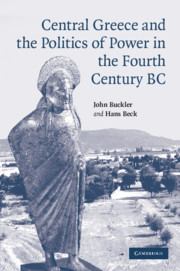Book contents
- Frontmatter
- Contents
- List of maps
- Preface
- Acknowledgments
- List of abbreviations
- Prologue
- Part I ALLIANCE
- Chapter 1 A survey of Theban and Athenian relations between 403–371 BC
- Chapter 2 The incident at Mt. Parnassus, 395 BC
- Chapter 3 The battle of Coronea and its historiographical legacy
- Chapter 4 The King's Peace, alliance, and Phoebidas’ strike (382 BC)
- Chapter 5 Sphodrias' raid and the evolution of the Athenian League
- Part II HEGEMONY
- Part III DOMINATION
- Epilogue
- Glossary
- References
- Index
Chapter 2 - The incident at Mt. Parnassus, 395 BC
from Part I - ALLIANCE
Published online by Cambridge University Press: 22 September 2009
- Frontmatter
- Contents
- List of maps
- Preface
- Acknowledgments
- List of abbreviations
- Prologue
- Part I ALLIANCE
- Chapter 1 A survey of Theban and Athenian relations between 403–371 BC
- Chapter 2 The incident at Mt. Parnassus, 395 BC
- Chapter 3 The battle of Coronea and its historiographical legacy
- Chapter 4 The King's Peace, alliance, and Phoebidas’ strike (382 BC)
- Chapter 5 Sphodrias' raid and the evolution of the Athenian League
- Part II HEGEMONY
- Part III DOMINATION
- Epilogue
- Glossary
- References
- Index
Summary
Since its discovery the Hellenica Oxyrhynchia has spawned considerable work on several popular topics, including the identity of the author, political groups and their policies in various states, the battle of Sardis, and the constitution of the Boeotian Confederacy. Yet one subject has been largely ignored, namely the curious events that ignited the Corinthian War. Not only of interest in themselves, they also require scholars to confront frankly such basic questions as the reliability of the Hellenica Oxyrhynchia and its relationship to previously known sources. What is more specifically important is that they demand a resolution of the several significant points where the testimony of the Oxyrhynchus historian directly contradicts that of Xenophon, the other contemporary and authoritative recorder of these events. In the instances where each author differs from the other, which are several, both cannot be right and their differences cannot be glossed over. One approach to this problem taken by many modern scholars is to pick and choose details from them as if their two accounts were some sort of historical smorgasbord concocted of ingredients of equal estimation. The soundest method, however, is to determine as far as possible which historian provides the more accurate and dependable evidence. The results of this pursuit amount to an exercise in both history and historiography.
The Hellenica Oxyrhynchia, Xenophon, Pausanias, and Plutarch agree on the following points, although, as will become obvious, they differ on a host of details.
- Type
- Chapter
- Information
- Publisher: Cambridge University PressPrint publication year: 2008



